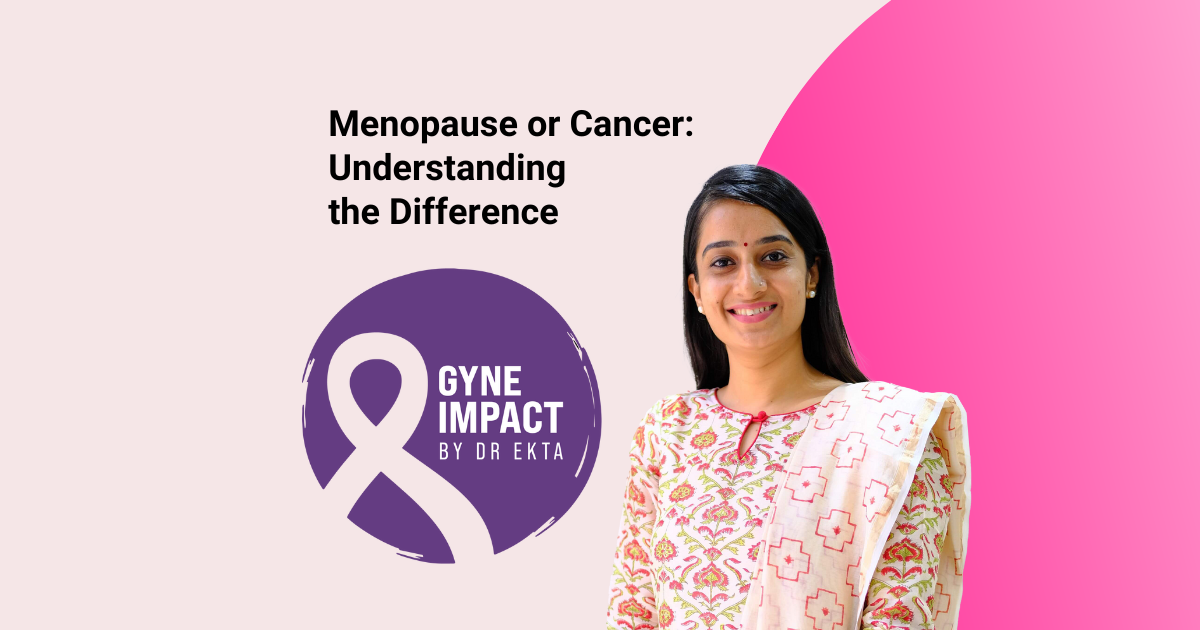I often meet women who are worried about their health when they experience unusual symptoms. One of the most common concerns I hear is: “Are my symptoms due to menopause or cancer?” This question is not surprising, as menopause brings many changes to a woman’s body, some of which can mimic the warning signs of cancer. Understanding the difference between menopause or cancer is crucial for timely diagnosis and peace of mind.
Menopause is a natural biological process that marks the end of a woman’s reproductive years. It typically occurs between the ages of 45 and 55 and is associated with a variety of hormonal changes. On the other hand, cancer is an uncontrolled growth of abnormal cells that can develop in different parts of the body, including the reproductive organs.
Common Symptoms of Menopause and How They Differ from Cancer
Many women going through menopause experience symptoms such as hot flashes, mood swings, irregular periods, and vaginal dryness. However, when symptoms like abnormal bleeding, persistent pain, unexplained weight loss, or extreme fatigue appear, it’s important to rule out cancer as a possible cause.
1. Abnormal Vaginal Bleeding
One of the most concerning symptoms that raises the question of menopause or cancer is abnormal vaginal bleeding. While menopause is often marked by irregular periods before they stop completely, postmenopausal bleeding is not normal and should be evaluated by a doctor.
Menopause: Periods become irregular before stopping completely. Spotting may occur but should not persist.
Cancer (e.g., uterine, cervical, or ovarian cancer): Bleeding after menopause, especially heavy or prolonged bleeding, should be investigated.
2. Pelvic Pain and Discomfort
Pelvic discomfort can be part of menopausal changes, but persistent or severe pain could be a warning sign of something more serious.
Menopause: Some women experience pelvic discomfort due to hormonal changes or osteoporosis-related issues.
Cancer: Persistent pelvic pain, bloating, or pressure in the lower abdomen can be signs of ovarian or uterine cancer.
3. Breast Changes
Many women worry about breast cancer, especially when they notice changes in their breasts during menopause. While some changes are hormonal, others may be a sign of cancer.
Menopause: Breast tenderness or mild swelling due to hormonal fluctuations.
Cancer: A lump, nipple discharge (especially if bloody), or skin changes like dimpling should be checked by a doctor.
4. Weight Changes
Weight gain is common in menopause due to metabolic changes, but unexplained weight loss can be a sign of cancer.
Menopause: Weight gain is more common, especially around the abdomen.
Cancer: Sudden, unexplained weight loss could indicate cancers like ovarian, pancreatic, or gastrointestinal cancer.
5. Fatigue and Weakness
Fatigue is common during menopause, but when it is extreme and persistent, it could be a sign of an underlying illness.
Menopause: Tiredness due to sleep disturbances, night sweats, or hormonal shifts.
Cancer: Constant fatigue that does not improve with rest can be a symptom of various cancers, including leukemia or colon cancer.
Key Diagnostic Tests to Distinguish Menopause from Cancer
If you are experiencing symptoms that could be linked to either menopause or cancer, your doctor may recommend the following tests:
Pelvic Exam: Checks for abnormalities in the cervix, uterus, and ovaries.
Pap Smear & HPV Test: Screens for cervical cancer.
Ultrasound & MRI: Helps detect abnormalities in the uterus and ovaries.
Mammogram & Breast Ultrasound: Detects signs of breast cancer.
Blood Tests (CA-125, CBC, Hormone Levels): Evaluates cancer markers and hormonal changes.
Endometrial Biopsy: Helps detect uterine cancer in cases of abnormal bleeding.
Reducing Your Risk and Staying Healthy
While menopause or cancer may share some symptoms, adopting a healthy lifestyle can help lower the risk of both conditions:
Regular Checkups: Get annual screenings, Pap smears, and mammograms as recommended by your doctor.
Healthy Diet: Focus on a balanced diet rich in fruits, vegetables, and whole grains.
Exercise Regularly: Maintain a healthy weight and stay active.
Avoid Smoking & Alcohol: Both can increase cancer risk.
Monitor Symptoms: Be aware of persistent changes and seek medical advice if anything unusual occurs.
Final Thoughts: Listen to Your Body
As an oncologist, I encourage all women to be proactive about their health. If you’re experiencing new or unusual symptoms and are unsure whether they are related to menopause or cancer, don’t hesitate to seek medical advice. Early detection plays a key role in improving outcomes and ensuring your well-being.
Understanding your body and staying informed can make all the difference in leading a long and healthy life.

